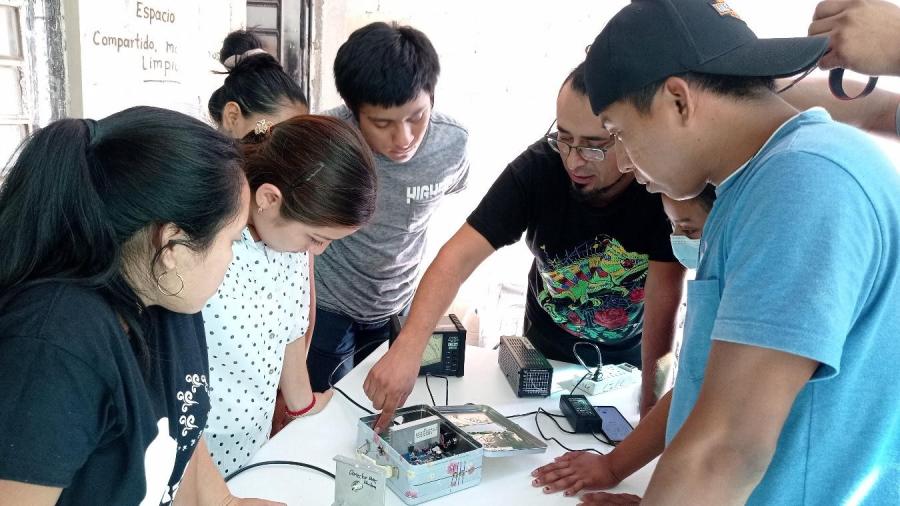
Radio Xilotepek, an Indigenous community radio station that has served the San Luis Jilotepeque community in Jalapa, Guatemala for over 13 years is a crucial source of information on Free, Prior and Informed Consent regarding the growth of extractive industries such as mining in the area. Over the past 20 years, Guatemala has seen an increasing number of extractive industry licenses granted on Indigenous territories by the government. There is also an increasing Indigenous movement building for the protection of their natural resources. In 2017, the Ministry of Energy and Mines of Guatemala reported that 307 current licenses of mineral and non-mineral extraction and 599 licenses were pending of approval, most of these licenses are for foreign companies.
Radio Xilotepek is one of Cultural Survival’s 2017 Community Media Grants Project grantees, an initiative that supports Indigenous community radio as a platform for Indigenous communities to exercise their rights to communication and freedom of expression of their histories, cultures, and languages.
In areas where communication resources such as internet access are limited or where commercial radio does not reflect the needs and interests of the community representing the interests of businesses, the presence of community radio is crucial and essential. Serving as as a link between different sectors of the community, community radio plays the role of informing locals of pressing issues and represents a voice of the region.
Radio Xilotepek, an all-volunteer run station, specializes in the defense of natural resources and strives to make its listeners aware of the need to protect the environment. Much work focuses on water and protection of the local forests--two resources that are becoming more scarce as years go by.
On November 13, 2016, a community consultation was held on mining and megaprojects in San Luis Jilotepeque. The question posed to the citizens was: "Do you agree with the mining and installation of megaprojects in the municipality of San Luis de Jilotepeque, Jalapa?" The results of this survey were clear and decisive. Out of total of 15,707 voters, 106 were null, and 87 in favor and 15,514 voted against. The result was possible thanks to the union of organizations that were fighting to rights of the people of San Luis. When the community consultation was held in 2016, Radio Xilotepek was one of the radio stations that was very engaged in raising awareness and dissemination of information in the impacts of extractive industries.
Darwin López, a volunteer at the station, commented on the stations’ role in raising awareness and his appreciation of the radio station’s heavy focus on protection of natural resources like water, forests, mining, and environmental health, “It was amazing to see all sectors unified. We realized that unity can bring strength to achieve something in common. We need to continue protecting the little resources we have…Radio Xilotepek is the only radio talking about these topics. We might be reaching one listener at a time, but we are creating change.”
One of the campaigns that is currently carried out by Radio Xilotepek involves water as a natural resource. The "Water for Life" campaign is being promoted at the national level with other community and alternative radio stations, to make people aware of a piece of legislation that is already in the Guatemalan Congress, the Water Framework Law.
The objective of the Water Framework Law is to regulate all the water resources in the country and everything related to its public domain. With this law, the government's intention is to prevent any company from privatizing the use or access to water as water is a basic resource and must remain in the public domain. According to Wálter Felix, of Guatemalan National Revolutionary Unity (URNG)--a Guatemalan political party, who supports this law said, "Water is not a commodity. It is a human right necessary to guarantee life."
Not everything is social awareness at Radio Xilotepek. To entertain their listeners and to keep them listening, the station plays local music and sometimes even live music by local musicians, enabling people to listen to live concerts from home.
The Community Media Grants Project grant will finance 12 workshops on investigative journalism, technical training for 20 current radio journalists, the organization of a community mining forum and the purchase of an audio recorder and a camera at the station.


